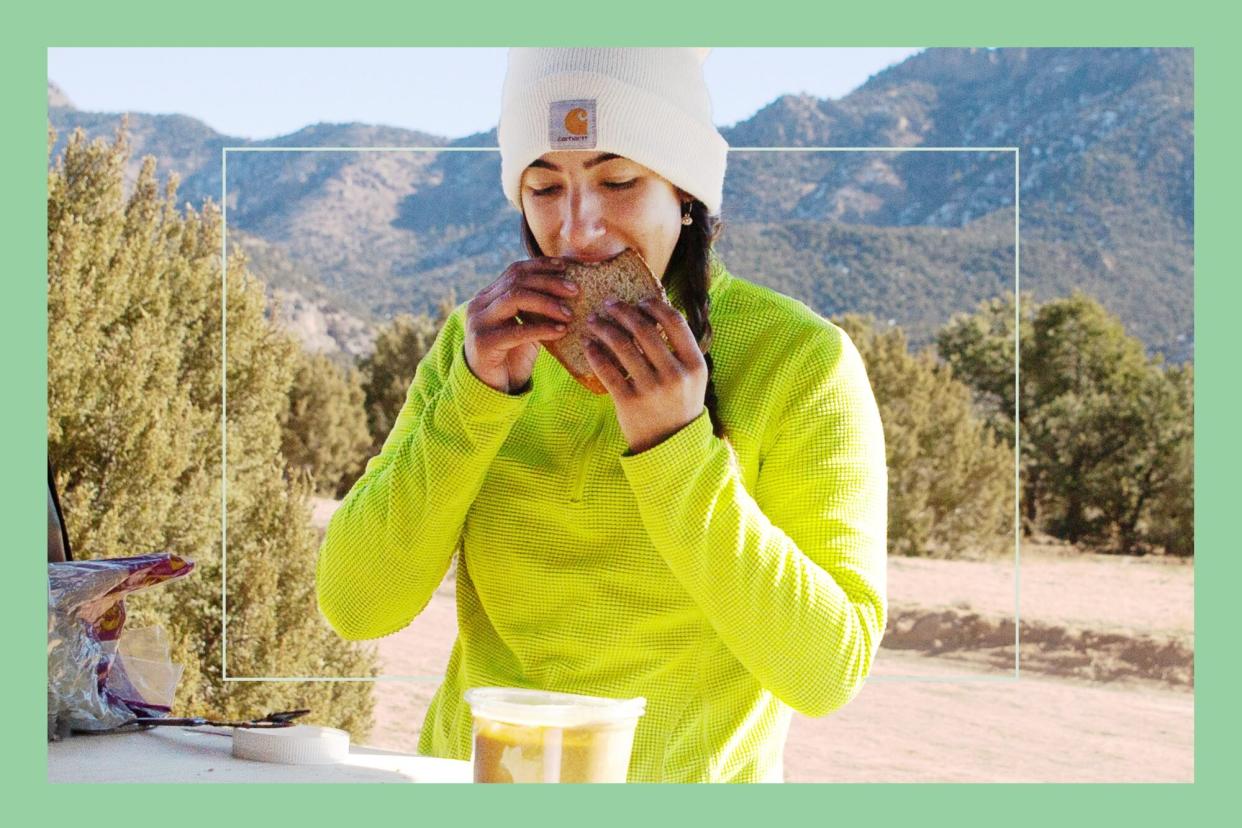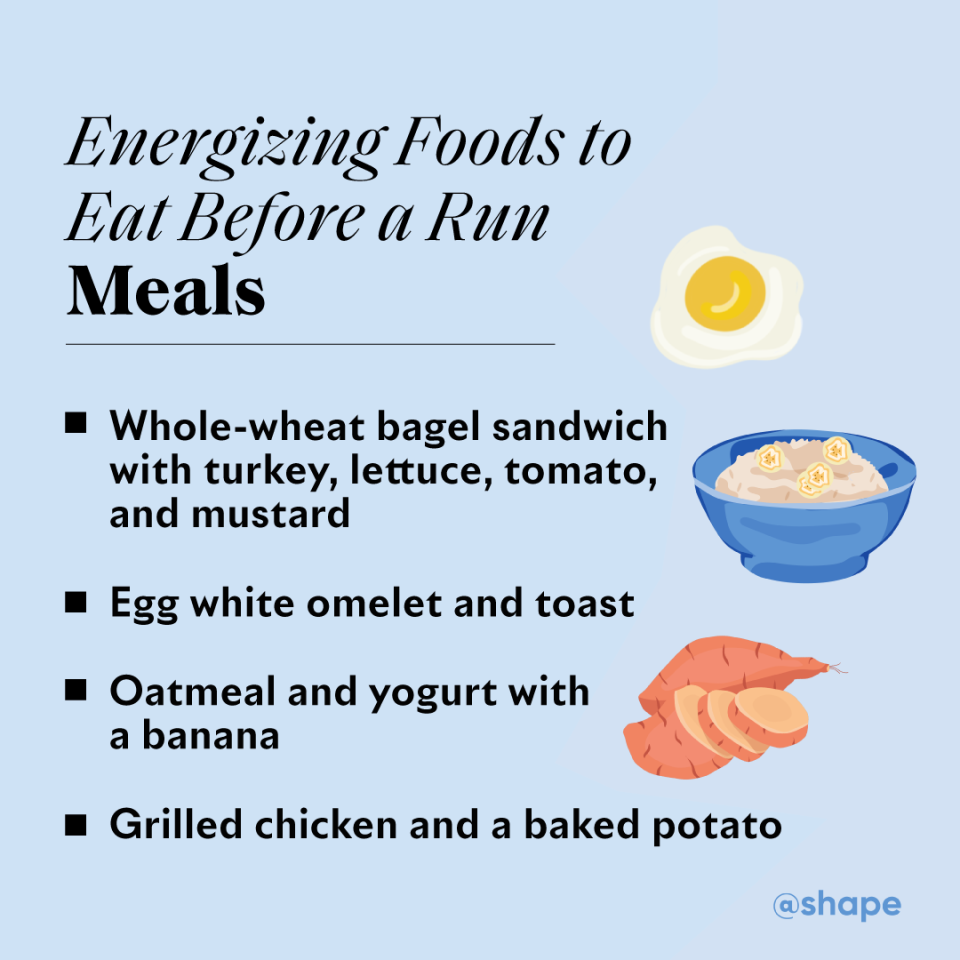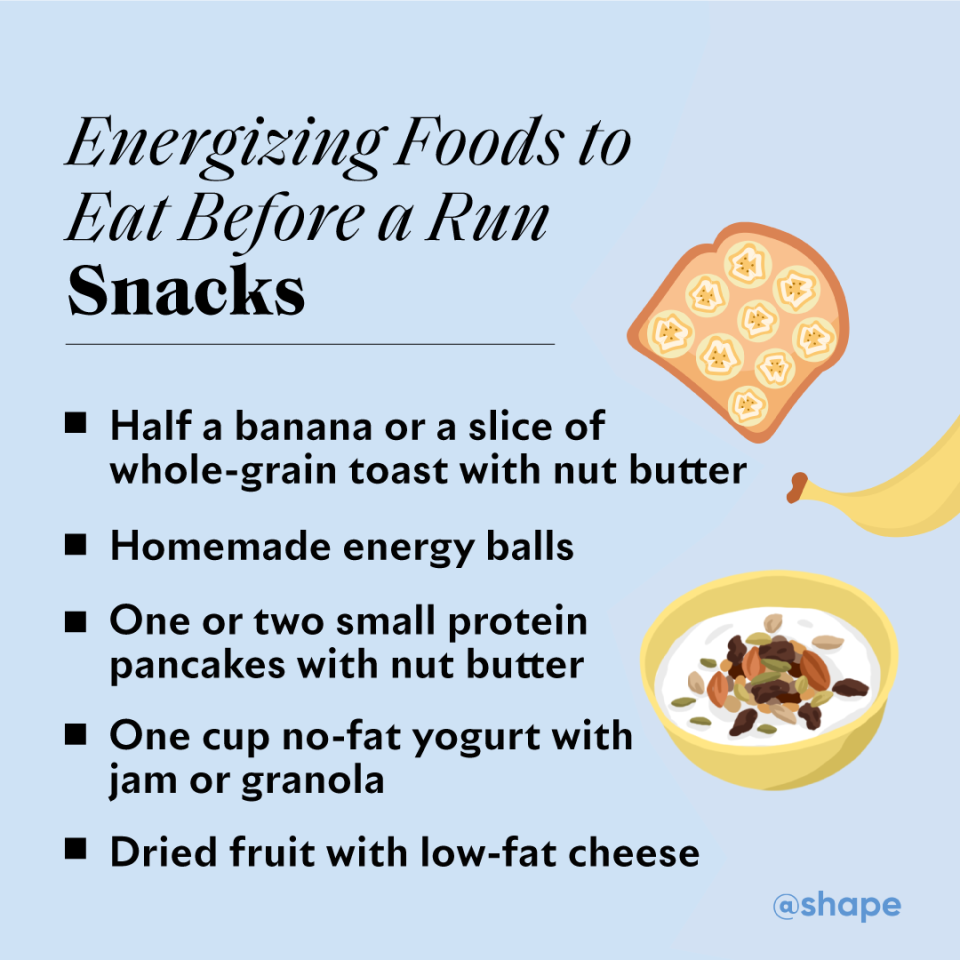What to Eat Before Running, According to Dietitians

Getty Images
Ask any long-time runner and, chances are, they have a horror story they're happy to relate — in too much detail — about that one time they ate that one thing and had a bathroom disaster on the run.
Everyone's stomach is different. Unfortunately, that means every runner has to find out for themselves (via trial-and-error) when and what to eat before running. But experts all agree: A pre-workout meal is vital for any athlete to properly fuel exercise.
Why You Need to Eat Before Running
Before breaking down what to eat before running, you need to understand why it's so important to nosh pre-cardio in the first place. "It's the last chance to thoroughly feed your body before an intense bout of exercise," says Andrew Wade, R.D., a registered dietitian and certified specialist in sports dietetics based in Pittsburgh, Pennsylvania. "Just as you fill up your gas tank before a long road trip, you have to give your body similar attention."'
You've probably rolled out of bed, skipped breakfast to make it to a morning workout class, and survived. So what's the big deal about making time for food pre-run? While you may be able to get through some workouts in a fasted state, taxing your body with a long run or high-intensity intervals guarantees that you're going to deplete your energy stores and then need more carbohydrates for fuel — and it's not great to start that kind of workout from a deficit. (See: Here's the Truth About Fasted Cardio)
"Since your body can only save a finite amount of carbs in the muscles and liver, it becomes important to maximize those stores going into a workout," says Wade. "Once your liver runs out of glycogen [energy], your blood sugar levels cannot be maintained, and your body crashes." FYI: That's one factor for hitting the dreaded "wall" in long-distance running. (Here's more about how carbs impact your workout performance.)
Plus, once your muscles run out of carbs, they turn to other sources, mainly fat. "The conversion of fat to usable energy for muscles takes a significant amount of time, so your body will not respond quickly enough to the increased needs mid-run," says Wade. "During this time, your body slows down, muscles fatigue, perceived exertion spikes, and performance significantly declines." Not ideal — especially during a long run. (FYI, learning that it takes time for your body to adapt to using fat as fuel is something keto dieters know well, and is also one of the reasons experts recommend keto dieters avoid intense workouts while initially adjusting to the new eating style.)
When to Eat Before Running
Along with knowing what to eat before running, you need to understand when to wolf down your meal or snack. If you're running later in the day, you should be properly fueled if you've been eating enough throughout the day and have timed your run to your last meal or snack. "Meals should be eaten three to four hours before you start running, and snacks can be consumed 30 to 60 minutes before a run," says Sabrina Russo, R.D., a registered dietitian in New York City.
However, when to eat — and how much — also depends on the distance or amount of time you're running.
60 minutes or less
In this case, your fuel will depend on your individual needs. You may not need anything extra, especially if you've been eating healthy through the day; or you might crave a quick burst of energy (from an easily digestible simple carb like a piece of fruit). "If you're planning to do a low- or moderate-intensity run for 30 to 40 minutes or less, it's OK if you haven't eaten for a few hours or if it's first thing in the morning before an overnight fast," says Russo. You'll have enough fuel in reserves, so you won't need to revisit your list of "what to eat before running."
60 to 90 minutes
"If you're running a long distance (six-plus miles) or planning to run for over 60 minutes, I recommend having a pre-run meal or snack," says Russo.
90+ minutes
If you're running for more than 90 minutes, you might need to refuel during your run. Research shows that your body's blood sugar, which it relies on for energy, can become depleted within one to two hours of running. For runs lasting longer than 90 minutes, the Academy of Nutrition and Dietetics and the American College of Sports Medicine both recommend eating 30 to 60 grams of carbs per hour spaced 15 to 20 minutes apart. (FYI: Sports nutrition products like drinks, bars, gels, and blocks are great on the run, but don't rely on them for daily nutrition.)
What to Eat Before Running
What to eat before running depends on when and how far you're planning to run — the longer you plan on running, the more fuel you need. (Note: No matter what your running plan is, don't forget the water! The best dietary habits in the world won't help if you're dehydrated, so drinking enough water is a crucial part of your fueling strategy.)
If you're having a full meal pre-run...
"A combination of simple and complex carbohydrates with protein to promote a sustained energy burn is a great formula to keep in mind for a pre-run meal or snack," says Jenna Amos, R.D.N., the in-house dietitian for Siggi's. "Simple carbohydrates are key for a quick energy source that will be used in the earlier stages of your run, while complex carbohydrates will have a slower burn and sustain you during your miles. A small to moderate amount of protein will slow digestion overall, helping for a steady release of energy to help you avoid burnout."
Some examples of what to eat before running for meals include:
a whole-wheat bagel sandwich with turkey, lettuce, tomato, and mustard
an egg white omelet and toast
oatmeal and yogurt with a banana
grilled chicken and a baked potato
If you're just having a pre-run snack...
"A pre-run snack should also contain a moderate amount of carbohydrates and protein and be low in fat and fiber, which are digested more slowly," says Russo. "Essentially, you want to consume foods that won't sit in your stomach for a long time (i.e. fiber and fat), but also won't cause a quick spike then crash of energy (i.e. candy or sugary drinks)," adds Amos. (Related: Tracee Ellis Ross 'Suffers Through' Applesauce Before Workouts — Here's Why)
Some examples of what to eat before running for snacks would be:
half a banana or a slice of whole-grain toast and one or two tablespoons nut butter (which works because it's more easily digested than full nuts)
homemade energy balls
one or two small protein pancakes and nut butter
one cup no-fat yogurt (carbs and protein in one!) with 1 tablespoon of jam or 1/4 cup granola
1/2 cup of dried fruit (a more concentrated carb source) with low-fat cheese
What Not to Eat Before Running
Steer clear of big, fat- and protein-heavy meals a few hours before a run, says Amos.
"Blood is diverted from non-essential organs, including the stomach, during intense physical activity," says Amos. "Since fat and protein naturally take longer to digest, this undigested food will remain in the stomach and intestines longer or get passed onto the next stages of digestion without properly breaking down, which can cause reflux or cramping."
Hence runners' gross GI stories — and as you nail down your personal pre-run dietary preferences, you'll probably end up with your own to share.

Caitlin-Marie Miner Ong

Caitlin-Marie Miner Ong

